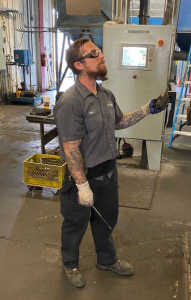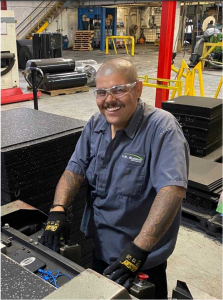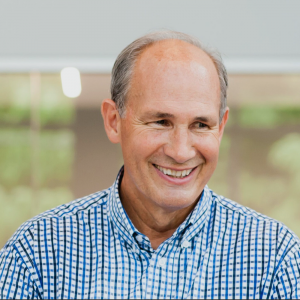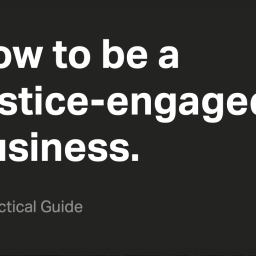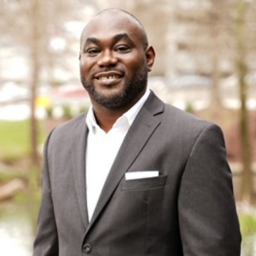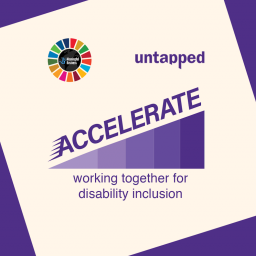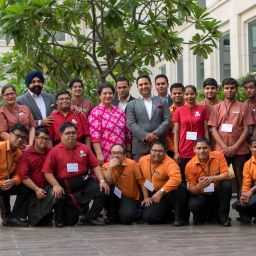Meaningful Business (MB:) Tell us a little BIT about U.S. Rubber?
Jeff Baldassari (JB): U.S. Rubber is a triple-bottom-line business located in California’s Inland Empire. We manufacture high quality fitness flooring and LEED-certified, sound-absorbing underlayment for multi-story buildings by recycling used truck tires. In 2020 alone, we diverted over 9 million pounds of post-consumer tire rubber from local landfills and we expect to divert 15 million pounds in 2021—that’s enough tires to stretch nearly the length of California, from U.S. Rubber’s Colton headquarters to the Oregon border.
About half our workforce consists of formerly incarcerated people, and an increasing number are military veterans. Our Bounce Back! second chance hiring programme is the soul of U.S. Rubber’s culture, which centres equity and open-mindedness in the belief that people deserve a second chance.
MB: When did you decide to adopt Second Chance Hiring policies, and why?
JB: When I joined the team in 2019, U.S. Rubber had already been hiring formerly incarcerated people for about 20 years, but the programme was treated as an afterthought rather than a source of strength. When I started, the first thing I did was overhaul our strategy and invest in the programme to make it more effective for both the business and employees looking to turn their lives around.
I gave the programme its name, Bounce Back!, which captures the essence of who we are as a company, giving a second chance to people and a second life to discarded materials. The investments included hiring a psychiatric rehabilitation counsellor who meets confidentially with our employees to help them resolve any issues they want to address at work or outside of it, and to help them understand the life lessons that many don’t have the opportunity to learn while in prison.
We get out of our business and employees what we put into them. And we owe much of our success to their success. My father taught me the importance of surrounding yourself with talented people and inspiring them to be their best, and I took that lesson to heart.
MB: What benefits have you seen from tapping into this talent pool?
JB: There are a couple of business cases to be made. The first is really simple. In a tough labour market, you either have enough people to fill shifts, or you don’t. We could not have grown our business during the pandemic by more than 100% if we didn’t have enough talented employees to produce orders.
Next, running a business with a purpose beyond making money gives your employees and customers something special to rally around—it gives customers a narrative to embrace that transcends the product. Second chance hiring is one way we create economic and social value for our stakeholders and the community where we operate.
Jeff Baldassari, President & CEO, U.S. Rubber Recycling
MB: What have some of the challenges been when employing people with criminal or arrest records?
JB: The biggest one that comes to mind is the turnover rate, which can be higher for our second chance employees than for a “standard” workforce. There are several reasons for this.
Many formerly incarcerated people leave prison without a support system or a way to support themselves. They may struggle with addiction or homelessness. Each of these factors is a significant barrier to success, no matter how badly a person wants to turn their life around.
There are also interpersonal challenges. Our Bounce Back! employees tell me that after prison, people feel like they’re in a fishbowl where everyone is watching and judging them based on their past mistakes. That negative self-consciousness must be eliminated in the workplace.
Even people who seem really promising at first sometimes fall off the wagon and stop showing up. I’ve come to understand that realistically, you need about a two-year period before you’re past the danger of a second chance employee sliding back into the habits and surroundings that got them in trouble in the first place. It takes that long for second chance hires to emotionally establish themselves in their post-prison life.
MB: What are the practical first steps prospective Second Chance employers should take, and What mechanisms or support systems should they put in place?
JB: Organisations like the Second Chance Business Coalition offer a host of resources for business leaders who are interested in exploring second chance hiring. Your city or county may also have programmes in place to help you find formerly incarcerated people who are looking for work.
The most important thing we did when revamping our programme was to encourage everyone on our team to build people up rather than look for reasons to tear them down. We also ask everyone, regardless of title or position, to contribute ideas because there’s no better way to show respect than to listen and to express gratitude. This respect goes a long way.
Managers who embrace and practice servant leadership every day will see greater results. There’s no better way to build a strong culture and teamwork than to put others first.
I also cannot say enough positive things about working with a mental health professional. Our HR manager, Nancy Lambert, changed the course of our onboarding and retention practices. Her prior experience working within the prison industry has been priceless. At the start of our hiring process, she screens our applicants in preliminary interviews and gives us an informed idea of whether someone is likely to work out as a member of our team.
Jake, a U.S. Rubber Recycling employee, and part of the ‘Bounce Back!’ programme.
MB: Why do you think it’s important that businesses help create meaningful second chances right now?
JB: First, most people deserve a second chance, especially when they’ve paid their debt to society and are committed to turning their lives around. All of us have made dumb choices, but only some people suffer significant consequences. There’s no reason we shouldn’t be able to learn from and move on from our mistakes.
Second, creating opportunity is good for our communities. People with a purpose and means to support themselves can contribute and take care of their families. There are 70 million Americans with a criminal record, and many of them struggle to find work, which traps them needlessly in a cycle of poverty. It doesn’t have to be this way.
Finally, many second chance hires have the talent that many businesses need to tap into right now. To ignore this talent pool during a labor shortage is shortsighted and imprudent.
MB: What are some of the social and economic factors to consider?
JB: Hiring a second chance workforce does require increased interpersonal and financial investment on the part of the business. There are plenty of factors you have to fight from “fishbowl syndrome” and potential homelessness to bias from other employees. But, especially in a tough labour market, the benefits of second chance hiring far outweigh the drawbacks. Many of our second chance workers are smart, driven, dedicated employees who bring strong skills to the job. The ones who work out will surprise you, and often themselves.
Leo, a U.S. Rubber Recycling employee, and part of the ‘Bounce Back!’ programme.
MB: Finally, what other words of advice would you give to companies who are embarking on their own Second Chance Hiring journey?
JB: Make your employees feel respected and included by asking for their input. They will appreciate the opportunity to contribute to the success of the business. It may be the first time anyone has involved them in decision-making. That show of faith will go a long way, and you will get some great ideas.
Second, offer your employees the freedom to make mistakes and learn. No one learns without making mistakes, and you run into bigger problems when you try to micromanage. Create a safe work environment where all employees don’t have someone looking over their shoulders. It’s amazing what people can achieve in a positive work environment.
If your employees are emotionally invested, feel supported and are given the opportunity to grow, they will be more likely to give it their all—and your business will grow as a result.
To quote Woody Hayes, “You win with people.” People are more important than strategies, computers, or machines. See your employees for what they can become not for something they did in the past.
______
TO JOIN The reimagining justice COMMUNITY, APPLY TO BECOME A MEMBER OF MEANINGFUL BUSINESS HERE



